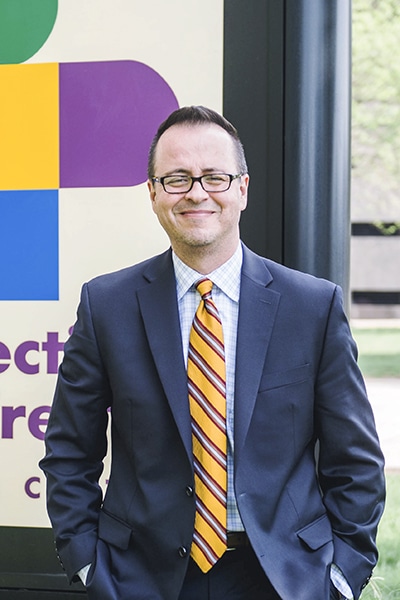At forty-three, Moses Vargas has already achieved what many would consider a full career’s worth. As vice president and general counsel for Connecticut Children’s Medical Center, Vargas admits he’s in danger of being relegated to the kids table at biannual meetings of fellow children’s hospital executives. “I know I’m one of the youngest, but more importantly, I’m surrounded by tons of bright and intelligent people who can teach me so much,” he says.
Vargas’s continued dedication to evolving in his role is evident not only in his approach, but also by the continual expansion of his responsibilities. While overseeing legal and compliance, in-depth roles such as clinical risk management and providing business and administrative guidance to leadership have challenged Vargas to successfully balance his legal foundations with complex operational stakeholders.
Since joining Connecticut Children’s in 2011, Vargas’s rise has been fast but not unexplainable. His commitment to the what of providing legal guidance as well as the how can be imperative to how seriously his colleagues heed his advice. “What differentiates a good lawyer from a great in-house lawyer is one who can take legal advice and relay it to his peers in a way that allows them to understand the issue,” he says. “I have to understand the business implications and can hopefully provide advice that is able to accomplish the needs of both.”

Vargas admits it’s not only possible, but that it makes it even more imperative for him to understand the members of the executive team and senior leadership. “If I know people well, I can tailor the delivery of my advice in a way that isn’t necessarily challenging or presumptive,” Vargas says. “I find success when I’m able to successfully engage with my executive team and senior leadership and help them accomplish their jobs.”
The general counsel’s success may also lie in his ability to manage the requirements of several, often disparate, stakeholders. Along with his more traditional legal obligations, he also oversees internal audit, which is responsible for auditing most of the organization’s departments. It’s a delicate balancing act of ensuring accuracy and compliance but not seeming like a threat to the rest of the organization. “Compliance and internal audit can be seen as invaders who are there to find problems,” Vargas says. “That’s not my philosophy. I always want to be collegial and collaborative and show people we’re here to help. We might find issues, but that’s OK.” Vargas says that working with this mind-set and in collaboration with department heads has earned compliance a trusted reputation that he aims to continue.
Vargas says taking the hospital’s business interests under his purview has required widening his scope from a strictly legal perspective. “As a vice president, I have to think about business decisions that take risk on, because we can’t be a risk-averse organization,” he says. “It’s important to recognize when I have to take my legal hat off.” Vargas says that can sometimes mean moving ahead with a business decision that wouldn’t always be his first move from a risk-adverse legal position. He reiterates the importance of working closely with the executive team and understanding that everyone involved is working for the betterment of Connecticut Children’s.
“I find success when I’m able to successfully engage with my executive team and senior leadership and help them accomplish their jobs.”
While business goals are always a priority, the organization also has a renewed focus on workplace safety. Vargas says he’s impressed with Connecticut Children’s commitment to issues highlighted by the #MeToo movement. “It is our responsibility to ensure that we are providing a safe environment for our employees so they feel comfortable and are able to work in a setting where they have no fear of harassment or retaliation,” Vargas says. Connecticut Children’s continues to evolve its workplace training, but Vargas believes it’s imperative for leadership to take ownership of these issues and ensure that they are seen as an absolute priority for the organization.
Workplace safety of a different sort also remains an essential priority for Vargas and the information security team at Connecticut Children’s. “As healthcare providers, our ability to render care is equally as important as a patient’s right to have his or her information be treated as confidential.” Connecticut Children’s is constantly assessing its vulnerabilities when it comes to data security, recently focusing on data phishing scams. Vargas says the information security team’s ever-evolving infrastructure to ensure privacy isn’t just done to comply with federal and states standards, but is due to their commitment to ensure patient information remains secure. “Our efforts are rooted in the knowledge that we are only safeguards of patients’ information,” he says. “We owe it to our patients to ensure that if they come to us, we’ll do everything we can to protect their data.”
As his responsibilities widen, he says that learning to examine issues from a clinical operations lens will further aid his evolution. “We have various initiatives to ensure that we’re providing top-quality care to keep patients safe and maintaining a strong clinical operation. These are all areas of a world I’m looking forward to getting to know better.”


